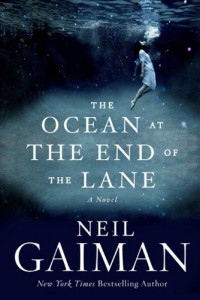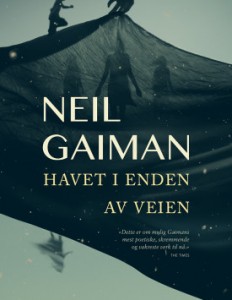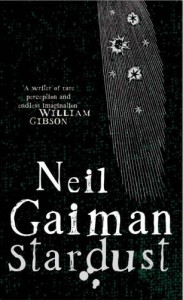 A new novel by Neil Gaiman? Don’t mind if I do.
A new novel by Neil Gaiman? Don’t mind if I do.
Jeg har en kopi av den norske oversettelsen å gi bort, se under anmeldelsen for detaljer.
I expected to love this book. I also expected to have a hard time putting it down once I started reading. The latter turned out to be true, the former? Unfortunately not so much. Which is not to say I hated it, either, I’m more on a ‘Meh’ sort of level.
A man returns to his childhood town for a funeral, but between the sevice and the social event afterwards he takes a drive to clear his head and finds himself at the site of his childhood home. He continues down the lane to the very end, where the Hempstocks still live, like they did when he was a child. He is plunged into memories, and the reader follows him through the recollection of something that happened when he was seven years old, when a suicide woke a creature that did not belong in this world.
Gaiman skillfully draws his characters, the three Hempstock women (Lettie is only 11 in appearance, but hardly a child) are indeed worth the aquaintance and who can resist a seven year old friendless boy who loves Gilbert & Sullivan and who lives mostly through books?
I went away in my head, into a book. That was where I went whenever real life was too hard or too inflexible. I pulled down a handful of my mother’s old books, from when she was a girl, and I read about schoolgirls having adventures in the 1930s and 1940s. Mostly they were up against smugglers or spies or fifth columnists, whatever they were, and the girls were always brave and they always knew exactly what to do. I was not brave, and I had no idea what to do.
(Page 58-59.) The book also deftly plays on the fine line between reality and fantasy in a child’s life, and raises questions about memory, how we remember and why no two people will agree on exactly what happened when a story is retold.
So why am I left unenthused? I suspect some explanation is to be found in my dislike of ‘horror’. The creature the children encounter is of the insiduous kind that easily triggers nightmares, and that, more than a real interest in the characters, was what kept me turning the pages. I needed the horror to be put to rest. It may also have contributed to my lack of engagement, I think I probably disengage emotionally from stories like these out of self-defence, if I don’t get involved it is less scary.
So perhaps I should say: «Mr. Gaiman, it’s not you, it’s me.»
———————————
Jeg fikk en epost fra Vendetta forlag med spørsmål om jeg hadde lyst på en kopi av den norske oversettelsen. Denne gangen sa jeg fra på forhånd at jeg kom til å lese boka på engelsk og lodde ut det norske eksemplaret, og siden det var greit for dem fikk jeg boka i posten. Jeg stusser riktignok litt over «innsalget» fra forlaget i eposten:
den mest tilgjengelige og litterære boken han har kommet med så langt (…) Det er ikke fantasy denne gangen så denne treffer nok flere lesere.
Ikke fantasy? Har vi lest samme bok?
At den er tilgjengelig stemmer kanskje, men jeg synes jo de tidligere bøkene er særdeles tilgjengelige også, Neverwhere, f.eks., og «litterær»? Tja. Hva betyr det? Både Anansi Boys og American Gods krever mer av leseren i form av kunnskap om myter og religion (for å få fullt utbytte, i alle fall), er ikke metalitteratur «litterært»?
 Den norske utgaven heter Havet i enden av veien, og er oversatt av Stian Omland. Kompetent gjort, forsåvidt. For eksempel la jeg merke til at «little pitcher» er oversatt, helt korrekt, med «lille gryte», til tross for at det ikke er noe mer som tilsier at vi har med et idiom å gjøre enn de to små ordene (på engelsk heter det «little pitchers have big ears», på norsk sier vi «små gryter har også ører»). Men det er ikke alltid norsken flyter like elegant som Gaimans engelsk. Og når Lettie slår over i dialekt (eller sosiolekt om du vil), som hun gjør innimellom, er det i den norske versjonen ingen merkbar endring.
Den norske utgaven heter Havet i enden av veien, og er oversatt av Stian Omland. Kompetent gjort, forsåvidt. For eksempel la jeg merke til at «little pitcher» er oversatt, helt korrekt, med «lille gryte», til tross for at det ikke er noe mer som tilsier at vi har med et idiom å gjøre enn de to små ordene (på engelsk heter det «little pitchers have big ears», på norsk sier vi «små gryter har også ører»). Men det er ikke alltid norsken flyter like elegant som Gaimans engelsk. Og når Lettie slår over i dialekt (eller sosiolekt om du vil), som hun gjør innimellom, er det i den norske versjonen ingen merkbar endring.
«Asked you to name yourself, I did. I en’t heard more’n empty boasts of age and time. Now, you tell me your name and I en’t asking you a third time.» She sounded more like a country girl than she ever had before.
(Side 41.) Sammenlignet med:
«Jeg ba deg si hva du heter, jeg. Og så hører jeg ikke annet enn tomt skryt om alder og tid. Så si hva du heter, og aldri om jeg spør deg for tredje gang.» Hun lød mer som en bondejente enn noen gang før.
(Side 47.) I orginalen plasserer dia-/sosiolekten Lettie i et landskap og på en rangstige i samfunnet, men samtidig er den med på å forsterke følelsen av at hun ikke er det hun ser ut til. Den dybden går tapt i oversettelsen. I tillegg har jeg problemer med flyten i Letties andre setning, «og aldri om jeg» måtte jeg lese flere ganger før setningen ga mening. Det virker som en unødvendig komplikasjon av syntaksen. Kan jeg få foreslå «Jeg spør ikke igjen»? (Eller til og med «Jeg spø’kke igjen», så får vi avgentrifisert språket litt også.)
Vel. Om du fortsatt har lyst til å lese Havet i enden av veien, etter min kritikk av både boka og oversettelsen (førstnevnte har utallige andre rost opp i skyene, da, så det er muligens bare meg det er noe galt med) har jeg altså et eksemplar å gi bort. Noe annet smågodt havner det sikkert også oppi pakka. Alt du trenger å gjøre for å delta er å kommentere på dette innlegget, denne gangen vil jeg gjerne at du forteller meg hvilken bok du ønsker deg til jul i kommentaren. Jeg trekker på søndag kveld klokken 20:00, for da kan jeg få sendt pakka før postens frist den 16. så den når fram til julaften.

